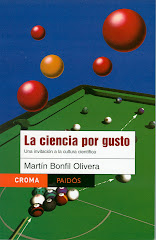Published on Milenio Diario, September 24, 2008
 It's tempting to say it like this:
It's tempting to say it like this:
The Large Hadron Collider (LHC), maybe the most complex machine ever built (no doubt, the most expensive one, almost 6 billion dollars), product of the collaboration of more than 20 Countries, which took almost 20 years to build and was feared, when it is started operations, to cause a planetary catastrophe… is out of order.
An electrical failure caused that nine of its one thousand conducting magnets to overheat and melt, causing a helium leak. This gas, in a liquid state, maintains the magnet's temperature at two degrees above absolute zero. These magnets accelerate protons to make them spin at 99.9 of light speed around the underground ring of
All that scandal for nothing?
But this version of the story, though tasty, is uninformed and simplistic. And misinformation can be a big problem: a young Indian woman, terrorized by the scandalous media reports about the possibility that the LHC would create a mini black hole that would swallow the earth, committed suicide by ingesting pesticide. It wasn't necessary.
The truth is that the start of operations of the Hadron (particles, like protons and neutrons, formed by the union of several quarks) Collider on September 10 did not represent any risk: it was only a test. Streams of protons were injected to start spinning, but were not made to collide.
When the real experiment is carried out - it's been postponed until spring, 2009 - there will be no risk, either. The probability of creating mini black holes is insignificant, and even if these were produced, they would disappear instantaneously, as they are very unstable.
The LHC will be useful to try to discover why matter has mass (and if the theoretical particle called Higgs boson, which would explain this property, really exists). It will also help to obtain a better understanding of the origin of the universe and the nature of “dark matter” and antimatter.
Has the LCH failed? Not so. Failures like these are a "psychological punch" for its creators, but were foreseen.
All technology requires an adjustment period. When the LHC functions properly, it will give answers to some of the most fundamental questions about the universe. But, as always in science, it is a long term investment.
(translated by Adrián Robles Benavides)
To receive Science for pleasure weekly
in your email, subscribe here!



